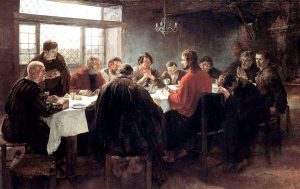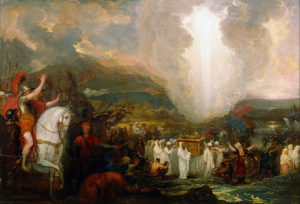Thoughts on Sunday’s Lessons for Aug. 25, 2024 (Pentecost 14B/Proper 16)

Jesus teaching his disciples at the Last Supper (1886), oil painting on canvas by Fritz von Uhde (1848-1911). Staatsgalerie Stuttgart, Germany. (Click image to enlarge.)
First Reading (Track One): 1 Kings 8:22-23, 41-43
The narrative of the kings of ancient Israel reaches its zenith as the wise and wealthy King Solomon, son of King David, dedicates the first Temple in Jerusalem. The Ark of the Covenant, God’s sanctuary on Earth, has a permanent home at last. Solomon speaks to all the assembled leaders of Israel and Judah, reminding them of God’s covenant with his father David: “There shall never fail you a successor before me to sit on the throne of Israel, if only your children look to their way, to walk before me as you have walked before me.” Sadly, as the narrative goes on, the people will fail to practice justice and righteousness. The nation will decline and fall, the temple will be destroyed, and the leaders will be sent to exile in Babylon as the prophets foretold.
First Reading (Track Two): Joshua 24:1-2a, 14-18
When we face major life choices, how do we decide? Where is God in this? Hear this challenging question through Sunday’s readings. First we hear Joshua, Moses’ successor, assembling the people whom he has led into the Promised Land after taking it in a fierce and bloody war with the Canaanites who had lived there for generations. Joshua confronts the people with a decision: Will they follow the gods of their new neighbors, or will they renew the covenant that their ancestors Abraham and Moses made with their own God who led them out of exile and through the desert? “Far be it from us that we should forsake the Lord to serve other gods,” they shout. … we will serve the Lord, for he is our God.”
Psalm (Track One): Psalm 84
This lyrical hymn of praise celebrates the joy of worshiping in the temple that Solomon built. Those who decide to put their trust in God – the Holy One of hosts – will receive God’s grace and glory, the Psalmist sings. The people in exile who prayed for God’s favor and accepted God’s covenant lived in trust that God would welcome them home. They waited in hope for the protection, favor and honor given to those who had trust. As God provides nests for the small birds, the psalm goes on, so will God provide for us: As God provides pools of water for thirsty travelers, so will God hear our prayers.
Psalm (Track Two): Psalm 34:15-22
We reach the conclusion of this hymn of praise and thanks to our merciful, saving God who delivers us from fear and trouble. Those who are righteous and just, those who make the decision to follow God’s commandments, will earn God’s protection against fear, sorrow and danger, the Psalmist assures us. But woe to those who choose otherwise – the wicked and the unrighteous – for they will eventually be punished. Even the righteous may suffer afflictions, but none who take refuge in God will be condemned.
Second Reading: Ephesians 6:10-20
The letter to the Ephesians comes to its end with a call to make a choice: As a persecuted church, a tiny minority in the Empire of Rome, the people clearly understood that their struggle – echoing Jesus’s promise in John’s bread discourse – was not against “blood and flesh” but against the powerful earthly rulers who stood for the forces of evil. Put on the whole armor of God, the writer urges them, mustering military metaphors: Wear the breastplate of righteousness, the shield of faith, the helmet, sword, and shoes that will make us ready to boldly declare our faith and proclaim the gospel of peace.
Gospel: John 6:56-69
Our monthlong journey through Jesus’s difficult discourse about eating his body and drinking his blood comes to its end on Sunday. In the earlier passages, we saw skeptics and those who were short on faith turn away from Jesus in disgust, quickly followed by some of the temple authorities. Now the division continues to grow, as even many of his own disciples become uncomfortable and leave. Only his closest disciples make the decision to remain with Jesus. “Lord, to whom can we go,” asks Peter. “You have the words of eternal life.” His closest followers accept this hard teaching, even if they don’t understand it; because they know Jesus as the Holy One of God. In the end their faith wins out over doubt.

